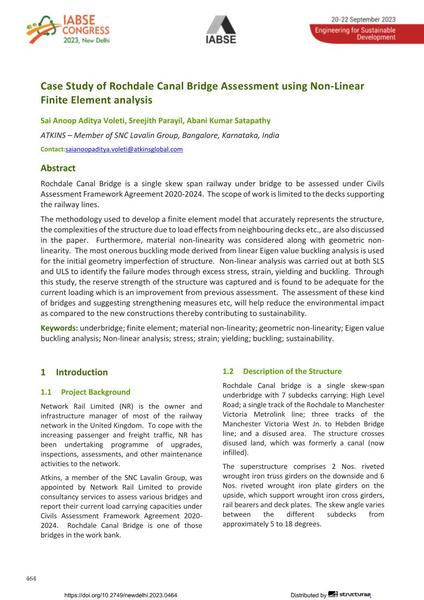Case Study of Rochdale Canal Bridge Assessment using Non-Linear Finite Element analysis

|
|
|||||||||||
Détails bibliographiques
| Auteur(s): |
Sai Anoop Aditya Voleti
(ATKINS - Member of SNC Lavalin Group, Bangalore, Karnataka, India)
Sreejith Parayil (ATKINS - Member of SNC Lavalin Group, Bangalore, Karnataka, India) Abani Kumar Satapathy (ATKINS - Member of SNC Lavalin Group, Bangalore, Karnataka, India) |
||||
|---|---|---|---|---|---|
| Médium: | papier de conférence | ||||
| Langue(s): | anglais | ||||
| Conférence: | IABSE Congress: Engineering for Sustainable Development, New Delhi, India, 20-22 September 2023 | ||||
| Publié dans: | IABSE Congress New Delhi 2023 | ||||
|
|||||
| Page(s): | 464-472 | ||||
| Nombre total de pages (du PDF): | 9 | ||||
| DOI: | 10.2749/newdelhi.2023.0464 | ||||
| Abstrait: |
Rochdale Canal Bridge is a single skew span railway under bridge to be assessed under Civils Assessment Framework Agreement 2020-2024. The scope of work is limited to the decks supporting the railway lines. The methodology used to develop a finite element model that accurately represents the structure, the complexities of the structure due to load effects from neighbouring decks etc., are also discussed in the paper. Furthermore, material non-linearity was considered along with geometric non- linearity. The most onerous buckling mode derived from linear Eigen value buckling analysis is used for the initial geometry imperfection of structure. Non-linear analysis was carried out at both SLS and ULS to identify the failure modes through excess stress, strain, yielding and buckling. Through this study, the reserve strength of the structure was captured and is found to be adequate for the current loading which is an improvement from previous assessment. The assessment of these kind of bridges and suggesting strengthening measures etc, will help reduce the environmental impact as compared to the new constructions thereby contributing to sustainability. |
||||
| Mots-clé: |
durabilité
|
||||
